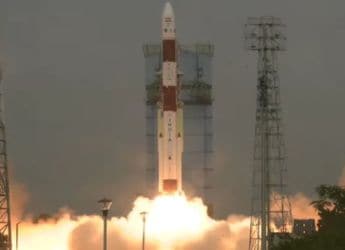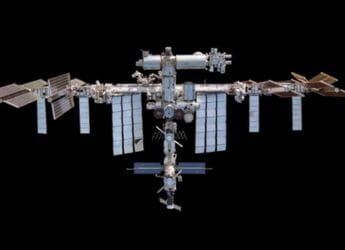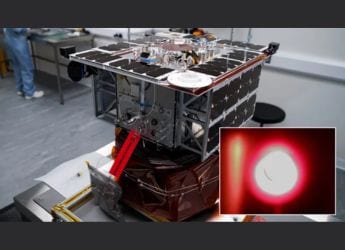- Home
- Science
- Science News
- Russia May Bring Forward Manned Launch After Rocket Failure
Russia May Bring Forward Manned Launch After Rocket Failure
The Soyuz MS-10 spacecraft
Russia said Friday it was likely to bring forward the flight of a new manned space mission to the International Space Station but postpone the launch of a cargo ship after a rocket failure that forced two crew members to make an emergency landing.
It was the first such incident in Russia's post-Soviet history - an unprecedented setback for the country's space industry.
Russian cosmonaut Aleksey Ovchinin and US astronaut Nick Hague sped back to Earth when the Soyuz rocket failed shortly after launching from Baikonur cosmodrome in Kazakhstan on Thursday.
The Soviet-designed Soyuz rocket is currently the world's only lifeline to the International Space Station and the accident will affect the work of the orbiting laboratory.
"We will try to bring forward the launch of a new crew," Sergei Krikalyov, executive director of the Russian space agency, told reporters.
He said the next unmanned cargo ship could go into space later than planned.
The next Soyuz launch had been scheduled to take a new three-person crew to the ISS on December 20 and a Progress cargo ship had been set to blast off on October 31.
Leaving ISS unmanned?
Veteran cosmonaut Krikalyov said that "in theory" the ISS could remain unmanned but added Russia would do "everything possible not to let this happen."
A spacewalk planned for mid-November has also been cancelled, he said. The crew had planned to examine a hole in a Russian spacecraft docked at the orbiting station.
Thursday's aborted launch took place in the presence of NASA Administrator Jim Bridenstine who was visiting Russia and Baikonur this week.
The incident was a huge embarrassment for Moscow, which has recently touted plans to send cosmonauts to the Moon and Mars.
All manned launches have been suspended and a criminal probe has been launched.
The Kremlin said experts were working to determine what caused the rocket failure.
"It is impossible to draw any conclusions now," President Vladimir Putin's spokesman Dmitry Peskov told reporters.
Ovchinin and Hague escaped unharmed and returned to the Star City training centre outside Moscow on Friday.
"The Russian cosmonaut and American astronaut are feeling fine," the Russian space agency said.
Roscosmos chief Dmitry Rogozin said the pair were likely to go into space in the spring.
"The guys will fly for sure," Rogozin said on Twitter, posting a picture of himself with smiling Ovchinin and Hague.
The crew on Thursday appeared to stay remarkably calm despite being subjected to strong deceleration forces.
"That was a quick flight," Ovchinin said calmly during the emergency landing.
Industry experts say the country's space industry has suffered so many mishaps that a serious accident during a manned mission was simply a matter of time.
Russia has lost cargo spacecraft and numerous satellites in recent years.
'Breakup of Soyuz'
The failed launch earned scathing criticism from the usually pliant Russian media.
"The breakup of the Soyuz," Kommersant broadsheet said in a frontpage headline.
Nezavisimaya Gazeta daily wrote: "The space industry crashed in a couple of minutes."
But observers also said the astronauts survived thanks to the reliability of the Soviet-era rocket's rescue system, which returned them safely to Earth despite the launch failure.
"As strange as it may seem, the accident at Baikonur only confirmed the reliability of the Russian rocket," said opposition newspaper Novaya Gazeta.
But it added that Russia's state space industry probably could not be saved "in its current form."
Industry experts say Russia should follow in the footsteps of the United States and Europe and develop commercial space launches.
In May, Putin tapped Rogozin to manage the space agency in a move that analysts said spelled trouble for the sector.
Rogozin has complained of problems with NASA and has suggested that a hole on the ISS could be the result of sabotage.
There have been only two similar aborted manned space launches in the history of the Soviet space programme.
In 1983, Vladimir Titov and Gennady Strekalov survived a fire during launch in Kazakhstan.
In 1975, Oleg Makarov and Vasily Lazarev made a successful emergency landing in the Altai mountains after problems during booster separation.
Catch the latest from the Consumer Electronics Show on Gadgets 360, at our CES 2026 hub.
Related Stories
- Samsung Galaxy Unpacked 2025
- ChatGPT
- Redmi Note 14 Pro+
- iPhone 16
- Apple Vision Pro
- Oneplus 12
- OnePlus Nord CE 3 Lite 5G
- iPhone 13
- Xiaomi 14 Pro
- Oppo Find N3
- Tecno Spark Go (2023)
- Realme V30
- Best Phones Under 25000
- Samsung Galaxy S24 Series
- Cryptocurrency
- iQoo 12
- Samsung Galaxy S24 Ultra
- Giottus
- Samsung Galaxy Z Flip 5
- Apple 'Scary Fast'
- Housefull 5
- GoPro Hero 12 Black Review
- Invincible Season 2
- JioGlass
- HD Ready TV
- Laptop Under 50000
- Smartwatch Under 10000
- Latest Mobile Phones
- Compare Phones
- Vivo Y500i
- OnePlus Turbo 6V
- OnePlus Turbo 6
- Itel Zeno 20 Max
- OPPO Reno 15 Pro Mini 5G
- Poco M8 Pro 5G
- Motorola Signature
- Vivo Y50e 5G
- Lenovo Yoga Slim 7x (2025)
- Lenovo Yoga Slim 7a
- Realme Pad 3
- OPPO Pad Air 5
- Xiaomi Watch 5
- Huawei Watch 10th Anniversary Edition
- Acerpure Nitro Z Series 100-inch QLED TV
- Samsung 43 Inch LED Ultra HD (4K) Smart TV (UA43UE81AFULXL)
- Asus ROG Ally
- Nintendo Switch Lite
- Haier 1.6 Ton 5 Star Inverter Split AC (HSU19G-MZAID5BN-INV)
- Haier 1.6 Ton 5 Star Inverter Split AC (HSU19G-MZAIM5BN-INV)

















